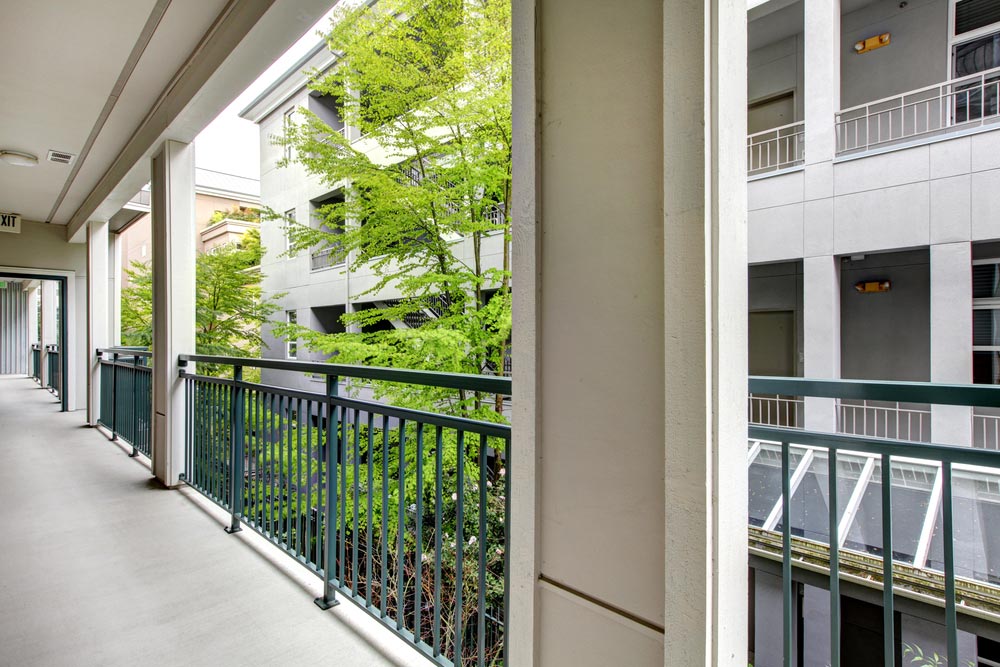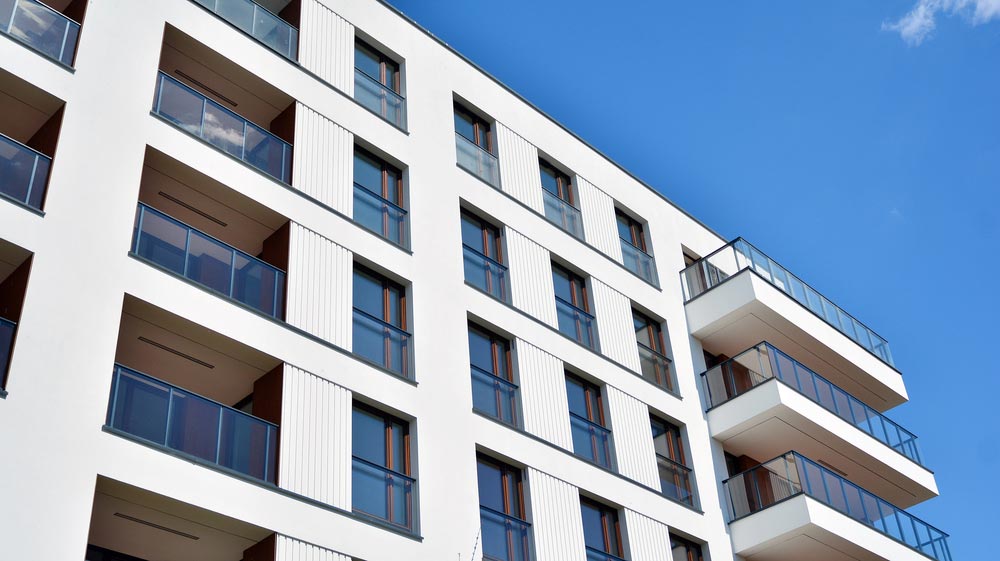Balconies play an important role in the design and function of commercial buildings, because they can provide functional outdoor spaces. But because they’re constantly exposed to weather, wear, and heavy use, they’re more prone to deterioration (which can happen over time). For property managers, addressing balcony maintenance and repairs is important for the building’s safety, compliance, and longevity.
Common Issues Associated with Commercial Balconies
Commercial balconies can deal with a number of issues. Some of them include the following:
- Concrete Cracking and Spalling — Concrete balconies are susceptible to cracks and surface deterioration, which can be caused by water infiltration and overloading. If you leave them unchecked, these issues can lead to structural damage.
- Waterproofing Failures — Aging or damaged waterproof membranes are a common cause of water infiltration, which can seriously damage the balcony’s structure and building components.
- Corrosion of Reinforcements — Moisture intrusion can cause the embedded steel reinforcements to corrode, which can weaken the balcony’s structural integrity.
- Railing Instability — Loose or deteriorated railings can be a safety hazard, especially in commercial buildings that experience a great deal of traffic. Many older balcony systems don’t meet current building code requirements.
According to the Consumer Product Safety Commission (CPSC), more than 33,000 injuries were reported because of the structural failures of balconies from 2003 to 2008. This data clearly illustrates the importance of proactive maintenance.

The Importance of Commercial Balcony Maintenance
Commercial balconies can deteriorate after so many years of heavy use and exposure to the elements. They can also show signs of wear, and what you see may only be part of the problem. Surface signs of deterioration are usually indications of a hidden (and more serious) structural issue.
If the balcony wasn’t installed properly or hasn’t been well maintained, water intrusion will be an inevitable issue that can lead to damage, code violations, and even safety hazards. It’s always a good idea to address these issues before they become more serious (and more expensive) problems.
The Importance of Regular Balcony Inspections
Routine inspections are important in identifying potential problems before they get worse. You should inspect your balcony at least once a year. But if the property is in a harsh climate, it should be done more frequently.
Work with structural engineers or people who are experienced in restoration to look for any hidden issues (such as sub-surface cracks or reinforcement corrosion) that may not be visible during a cursory check. Pay close attention to critical areas (such as drainage points, joint sealants, and load-bearing components). You also want to document what you find, so you can establish a maintenance history.
Common Repair Techniques for Commercial Balconies
Some of the common techniques for balcony repair include the following:
- Concrete Repair — For localized cracks or spalling, high-performance repair mortars can be used to restore the structural and aesthetic quality of the concrete.
- Waterproofing Solutions — You can replace outdated or damaged membranes with modern options that are more durable (such as liquid-applied membranes or sheet systems). Proper detailing is an important step in preventing future water intrusion.
- Structural Reinforcement — If the reinforcement bars have been severely corroded or weakened in any way, they may need to be replaced so their load-bearing capacity can be restored.,
- Railing Upgrades — You can replace your old railings with ones that are made out of corrosion-resistant materials (such as stainless steel or powder-coated aluminum).
If you want your commercial balcony to be effectively repaired, you need to choose the right method, which should be based on the type and extent of the damage. You should work with a contractor who specializes in balcony repair to help you determine the right approach.

Safety and Code Compliance for Commercial Balconies
Any type of balcony repair must make occupant safety and compliance with local building regulations a priority. This can include any load-bearing requirements and railing specifications. You must also install barriers or restrict access to your balconies while the repairs are being performed, because it will minimize any liability risks. You may also want to consider adding slip-resistant coatings and durable finishes to make your balcony safer. It can even reduce the need for regular maintenance.
After the repairs have been completed, you need to implement a program that will extend the life of the balcony. Regular cleaning will keep the surface clear of debris and other types of organic matter — all of which can accelerate the deterioration process. You should also inspect its waterproofing systems on a regular basis while reapplying sealants and membranes as needed. You don’t want to forget about your drainage systems, which should be clear of any blockages.
If you’re looking for one of the best places for the repair and replacement of commercial balconies in Corpus Christi, be sure to reach out to Bayfront Roofing.